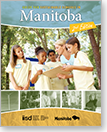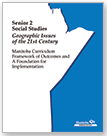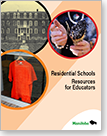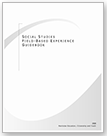Charting New Relationships: Black History and Anti-racism in Canada
Charting New Relationships: Black History and Anti-racism in Canada
Indigenous Peoples, Black Peoples, and Peoples of Colour have a shared history of racism, of exclusion and marginalization, in Canada and in other nations. It is important to recognize the multi-faceted nature of racism in our land. While Indigenous Peoples, Black Peoples, and Peoples of Colour have and continue to experience racism that is similar in many ways, in many other ways the racism experienced by Indigenous peoples in Canada is unique. Colonialism, the Indian Act, and the residential school system, for example, have created a “dual track” of racism that is distinct among First Nations,Métis, and Inuit people.
Education for Sustainable Development
Education for Sustainable Development
Education for Sustainable Development involves incorporating key themes of sustainable development – such as poverty alleviation, human rights, health and environmental protection, climate change – into the education system. ESD is a complex and evolving concept and requires learning about key themes from a social, cultural, environmental and economic perspective and explores how those factors are inter-related and inter-dependent. The Venn diagram below represents the inter-relationship of the themes.
 Guide for Sustainable Schools in Manitoba
Guide for Sustainable Schools in Manitoba
Education for Sustainable Development (ESD) entails a reorienting of education to guide and motivate people to become responsible citizens of the planet. It addresses the interrelationships among the environment, the economy, and society: “ESD aims to help people to develop the attitudes, skills, perspectives and knowledge to make informed decisions and act upon them for the benefit of themselves and others, now and in the future” (UNESCO, n.d.). ESD moves from students learning about sustainable development to students experiencing how to live sustainably.
Incorporating Indigenous Perspectives
Incorporating Indigenous Perspectives: A Themed-Based Curricular Approach
To support the incorporation of Indigenous Perspectives, the Indigenous Education Directorate, through Indigenous Education has established goals that are based on the premise that school environments inclusive of Indigenous knowledge and perspectives will improve student success and completion rates, increase employability skills and reduce transiency.
Geographic Issues of the 21st Century
 Grade 10 Geographic Issues of the 21st Century - Foundation for Implementation
Grade 10 Geographic Issues of the 21st Century - Foundation for Implementation
Grade 10 Geographic Issues of the 21st Century - Resources ( 71 KB)
71 KB)
Social studies is the study of people in relation to each other and to the world in which they live. In Manitoba, social studies comprises the disciplines of history and geography, draws upon the social sciences, and integrates relevant content from the humanities. Social studies helps students acquire the skills, knowledge, and values necessary to become active democratic citizens and contributing members of their communities, locally, nationally, and globally.
American History
Grade 10 American History - Course Overview ( 21.5 KB)
21.5 KB)
The primary intent of the American History course is to create a greater understanding of significant historical events that shaped the United States. It is intended to be a survey course with a focus and emphasis on those historical developments that have influenced the world, especially Canada.
Historical Thinking Project
The Historical Thinking Project was designed to foster a new approach to history education — with the potential to shift how teachers teach and how students learn, in line with recent international research on history learning.
Residential Schools
 Residential Schools: Resources for Educators
Residential Schools: Resources for Educators
As a society, we must recognize the tragic legacy of residential schools and colonialism. Beyond recognition, however, education has an important role in raising awareness of the impact of residential schools. It is incumbent upon Canadians to learn from the past and respond to the Calls to Action of the Truth and Reconciliation Commission of Canada in order to promote healing and reconciliation.
Social Studies Field-Based Experience Guidebook
 Social Studies Field-Based Experience Guidebook
Social Studies Field-Based Experience Guidebook
Social Studies Field-Based Experience Guidebook has been prepared to support the implementation of the new Manitoba Kindergarten to Grade 12 social studies curriculum. It provides examples of field-based experiences for various grades, and lists relevant specific learning outcomes (SLOs) for each activity. Skills outcomes are not specified for the activities, as it is left to the teacher’s discretion to decide which skills to focus on during each field-based experience.